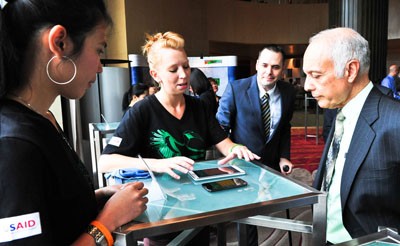
For Immediate Release
BANGKOK, September 17, 2014 – Association of Southeast Asian Nations (ASEAN), the U.S. Agency for International Development (USAID) and Freeland today launched WildScan, a new endangered species identification and response mobile application for law enforcement to use in combatting the multi-billion dollar illegal wildlife trade.
The mobile application is designed to help law enforcement officials respond to wildlife trafficking, an illicit trade estimated at $19 billion per year and run by organized criminal syndicates. WildScan contains photos and critical information for over 280 endangered species and illegal wildlife products commonly trafficked into and throughout Southeast Asia to assist in proper identification and rapid response.
“Wildlife trafficking in Southeast Asia is a serious threat to biodiversity, human wellbeing, and feeds into transnational organized criminal networks,” said Mr. Do Quang Tung, the Chairperson of the Association of Southeast Asian Nations’ Wildlife Enforcement Network (ASEAN-WEN) and Chief of the CITES Management Authority of Vietnam. “This app is a game-changing approach that empowers law enforcers and the public at large across the region to work together and fight back.”
ASEAN-WEN, an integrated ASEAN enforcement body composed of environment, police and customs officials working together to combat wildlife and marine resources trafficking in Southeast Asia, has supported the development of this app that digitizes and upgrades its existing species ID manual.
“The U.S. Government is strongly committed to working with partners in the region to address this serious and growing problem, and smart and creative use of technology, like WildScan, will contribute much to these efforts," said U.S. Ambassador Kristie A. Kenney. “The application makes it possible for all of us to report wildlife trafficking and do our part to support ongoing law enforcement efforts to counter this illegal trade.”
WildScan was produced through a collaborative partnership between academics, law enforcement, scientists and other wildlife specialists. Developed under the USAID-funded Asia’s Regional Response to Endangered Species Trafficking (ARREST) Program, implemented by Freeland, the application allows users to input information such as the color and size of the animal in question to quickly identify the species. It also includes essential animal care instructions and a simple reporting function.
Many endangered animals, including birds and turtles, are smuggled with non-protected species, making timely identification difficult for authorities. Through a unique identification tool and high resolution photos, WildScan increases the ability of law enforcement to effectively and efficiently identify animals and animal products without having to use large reference books.
Another less known component of the illicit wildlife trade is the illegal pet trade in endangered animals, which ranges from primates to exotic reptiles and insects. Consumers are often unable to distinguish between which animals qualify as legal pets, a situation further complicated by the fact many countries are not effectively enforcing wildlife laws. WildScan will provide information about endangered and protected species so that they can make informed decisions about choosing pets.
The International Union for Conservation of Nature (IUCN) played a large role in WildScan’s development, with support from various specialist groups of IUCN’s Species Survival Commission and Red List Authorities, verifying the information provided for many of the endangered species. The U.S. Fish and Wildlife Service (USFWS) contributed knowledge on the wildlife products section. The Zoological Society of London (ZSL) and the World Animal Protection (WAP) provided detailed temporary care instructions and Cummings School of Veterinary Medicine at Tufts University contributed to information that will be used to help warn users of potential disease wildlife can transmit to humans.
WildScan is available for free download on Android devices via Google Play and will support Chinese, Thai and Vietnamese languages in 2015.
Visit www.wildscanapp.com for more information.
Read remarks of USAID Mission Director Michael Yates at the app launch.
See photos of the WildScan launch event.







Comment
Make a general inquiry or suggest an improvement.